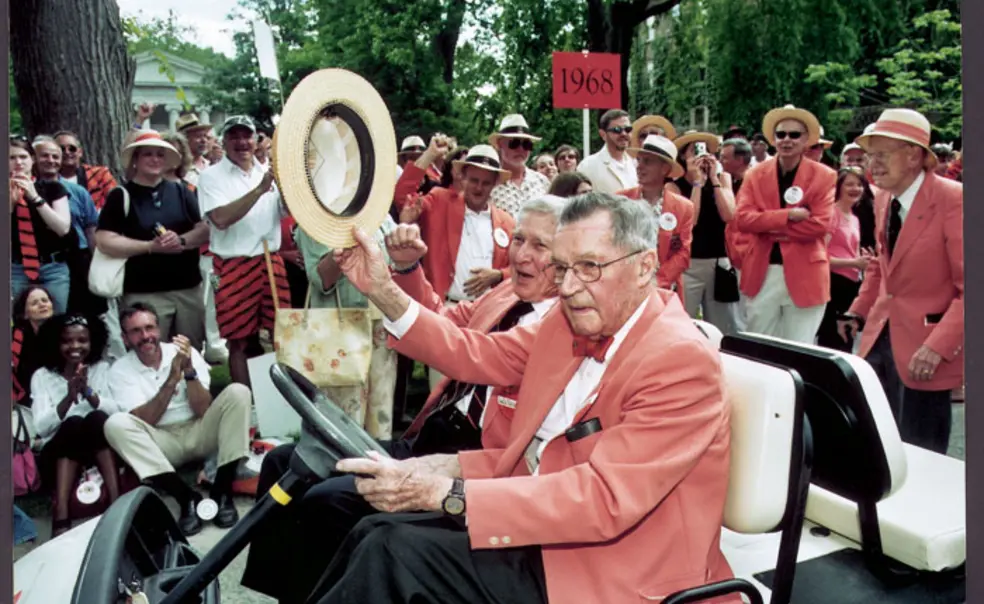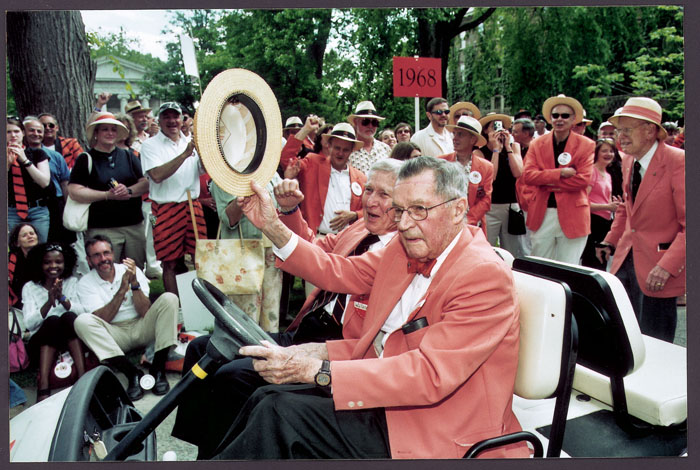Remembering Bob Goheen '40 *48
Modest and plain-spoken, Princeton's 16th president believed in honest talk
Robert F. Goheen ’40 *48, president of Princeton from 1957 to 1972, died March 31 at the University Medical Center at Princeton. He was 88. Following is an appreciation by Merrell Noden ’78, a freelance writer and frequent PAW contributor, who spoke with Goheen for a Nov. 8, 2006, story marking the 70th anniversary of Goheen’s arrival on the Princeton campus.
I was not sure what to expect back in the fall of 2006, as I walked through Robertson Hall on my way to meet Bob Goheen ’40 *48 for the first time. I came to Princeton in 1974, two years after Goheen had stepped down following 15 momentous years as University president. It’s hard to imagine how that time could have been more eventful: Goheen had welcomed minority students in real numbers, overseen the transition to coeducation, and transformed Princeton from an excellent undergraduate school into a world-class research university. To accomplish all that at any time would be an awesome achievement, but to do at a time of widespread paranoia, violence, and uneasiness about change was testament to the deep trust Goheen inspired in faculty and students alike. I knew the legacy but not the man.
Goheen’s secretary offered to take me to his office. We rounded a corner and there, walking slowly before us, was Bob Goheen. Sensing that it would be ungracious to catch him, we slowed down to give him time to reach his office. A few moments later he stood up to shake my hand and then sat down, slightly breathless. His hair was rumpled, and he was not wearing his trademark bowtie. There was no self-importance or vanity about him.
In my preliminary interviews with Goheen’s colleagues and friends, I’d been told that he was, above all else, a straight talker, willing to speak his mind even when he knew his words would be unpopular. This was not because he believed he was always right — he most certainly didn’t — but because he believed that frank, respectful talk was essential to learning and human progress. They were the foundation of the enlightenment values he held so dear.
Goheen had demonstrated his faith in the power of honest talk in the spring of 1970, soon after U.S. troops had crossed the border from Vietnam into Cambodia and all hell was breaking loose on campuses around the country. At that most precarious of times, Goheen’s response had not been to silence his opposition but to invite all members of the University to Jadwin Gym to speak their minds. Four thousand showed up to sound off. “I think it was a healthy airing of frustration and anger,” Goheen told me.
And that was how I found him to be on the day we met: modest, plain-spoken, and unafraid of his own opinions. When I noted that of all Princeton presidents he seemed to be uniquely beloved by Princeton alumni, he snorted and said, “By some of them.” He told me of his deep disappointment upon learning that Woodrow Wilson 1879 was a “Southern racist.” It was not hard to hear how much it had hurt to reach that conclusion about someone he’d once so admired. Still, his most scathing remarks were saved for the current occupant of the White House. “This administration’s so bad, it’s shocking,” he said with a vehemence that made me fear for his health. He said he was particularly disappointed to find Princeton graduates among those who led us into the Iraq war. He’d been reading a lot of books on recent foreign policy and was convinced that we needed an entirely different approach to foreign policy, one that did more than just pay lip service to the feelings of other nations. “We Westerners are really not very empathetic toward non-Western people,” he said.
Goheen came by his empathy at an early age. He grew up in Vengurla, India, where his parents were serving as medical missionaries, treating wealthy Portuguese settlers partly in order to raise money to build a leprosarium and a sanitarium for patients with tuberculosis. Until he left India for the Lawrenceville School as a high school junior, he would spend half the year with them and the other half at a boarding school in the Palani Hills of southwestern India run by fellow missionaries. Most of his family’s friends were Indian, and that early experience of being a minority, though certainly a privileged one, seemed to give him a lasting empathy for the powerless.
President Tilghman issued the following statement on the death of former president Robert F. Goheen ’40 *48
"With the passage of time, it becomes more and more clear that Bob Goheen was one of the great presidents of Princeton history. He demonstrated remarkable courage in all he did, from introducing coeducation and increasing the diversity of the student body to strengthening the faculty and leading the University successfully through a time of societal upheaval in the late 1960s and early 1970s. he was greatly admired and respected for his leadership and vision and attentiveness to the views of others, and widely beloved among Princetonians for the values and personal qualities that were evident from the day he arrived on campus as a freshman and throughout his life."
Bill Bowen *58, who would succeed him as president, had the most telling story about Goheen’s faith in the power of honest talk. When Goheen asked him to consider becoming provost, Bowen hesitated, reminding Goheen that they disagreed on a fundamental issue, coeducation (Goheen originally opposed it). Bowen worried that their disagreement would hinder their working together.
Goheen’s answer was a model of open-mindedness. “I’m happy to have you hold your own views,” he told Bowen. “You should! Do your best to persuade me. Let’s go forward together.”
We all know who won in the debate over coeducation: Princeton. “And of course,” says Bowen, “it was Bob who had the hard job — I had the easy job — which was changing his mind. And he did that. How many people are open-minded enough, willing enough to be persuaded, interested in evidence, to do that?”
Goheen had been a pretty fair soccer player as a Princeton undergrad and remained a sports fan. He met Bowen on the Grad College tennis courts. When I asked Goheen about his old friend’s research on college sports and his finding that recruited athletes didn’t perform at the same academic level as the student body, he said, “Bill is my best friend, but I think he exaggerates the problem.” That is a quintessentially Goheenian observation, revealing, as it does, both his deep affection for a friend as well as a readiness to disagree with him. This, Goheen’s example tells us, is what civilized people do to become better.Modest to his core, Goheen always saw himself as the recipient of more than his share of good fortune. The old Greek scholar in him liked to cite the Greek concept of tuche, or fortune, to explain his own success. “At critical times in my life things have just broken my way that I wouldn’t have expected to go my way,” he said. Still, there’s no doubt that when the Board of Trustees unexpectedly chose a 37-year-old classics professor to lead the University through the stormy times to come, the real good fortune was Princeton’s.













No responses yet